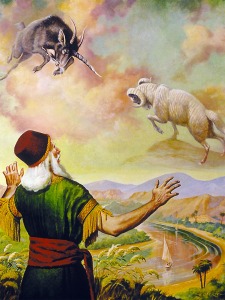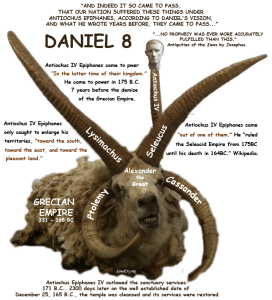
Daniel 8:26 is an interesting verse. It reads:
"The vision of the evenings and mornings
Which has been told is true;
But keep the vision secret,
For it pertains to many days in the future.”
Of course, it would be ludicrous of us to simply focus on that verse with no reliance upon any context whatsoever. In order to learn what the verse actually means, context will make or break things for us. In this case, word studies are also relevant, although numerous commentators argue that the original language leaves room for uncertainty. In spite of this, people today will latch onto this verse (or others) and claim they "know" they meaning. It is settled for them and needs no further explanation. A person who might disagree with them will be held in contempt for certain.
The people who have this approach where Scripture is concerned should probably be avoided. Let's face it. They are not Jesus Christ and even though they - as Christians - have the Holy Spirit within them, it still does not mean that they understand Scripture correctly at every turn. They can be wrong and may well be wrong. They just don't like to admit that possibility.
With respect to this particular verse, I'd like to focus on the last portion of it - "But keep the vision secret, for it pertains to many days in the future." Other translations read as follows:
- "The vision of the evenings and the mornings that has been told is true, but seal up the vision, for it refers to many days from now.” (ESV)
- "And the vision of the evening and the morning which was told is true: wherefore shut thou up the vision; for it shall be for many days." (KJV)
- "The vision of the evenings and the mornings that has been told is true. Now you must seal up the vision because it refers to many days in the future." (HSCB)
- "The vision about the twilights and dawnings that has been related is trustworthy, but keep its vision secret, because it pertains to the distant future." (ISB)
- "The vision of the evenings and mornings that was told to you is correct. But you should seal up the vision, for it refers to a time many days from now." (NET)
- "And the vision of the evenings and mornings which hath been told is true: but shut thou up the vision; for it belongeth to many days to come." (ASB)
- "And the vision of the evening and the morning, which was told, is true: thou therefore seal up the vision, because it shall come to pass after many days." (Douay-Rheims Bible)
- "And the vision of the evening and the morning which hath been told is true; but close thou up the vision, for it is for many days [to come]." (Darby)
- "And the vision of the evenings and mornings which hath been told is true: but shut thou up the vision; for it belongeth to many days to come." (ERV)
- "And the appearance of the evening and of the morning, that is told, is true; and thou, hide thou the vision, for it is after many days." (YLT)
I did not include all versions, just most of the main ones. With the exception of the ISB and YLT versions, the other versions speak of "shutting up" or "sealing up" the vision. Some tend to take this verse to mean that Daniel was supposed to hide the scroll so that no one would have access to it since the full meaning of it would not come to light until the time of the Tribulation.
Of course, this leads us to ask whether or not this warning given by Gabriel was for the entire book of Daniel, or simply just that small section in Daniel 8. The whole of Daniel speaks of several things:
- a vision of the ram and the goat (Daniel 8:1-8)
- a vision of the little horn (Daniel 8:9-14)
- the interpretation of the visions (Daniel 8:15-27)
- the ram (Daniel 8:20)
- the goat (Daniel 8:21-26)
- Daniel's reaction (Daniel 8:27)
While it is possible that Gabriel is telling Daniel to "hide" the vision so that no one finds out the meaning until the appointed time. But that cannot be because commentators for generations have understood the meaning. The only one who might not have fully understood the meaning was Daniel himself because these events had not yet occurred. This is certainly not uncommon for prophets to fail to grasp meaning. We spoke of Zechariah 9:9-10 previous in which there is an obvious (and very long) gap of time between those two verses. Yet, it is certain that Zechariah had no knowledge of it.
Albert Barnes offers this explanation for this verse. "
Seal it up. Make a record of it, that it may be preserved, and that its fulfillment may be marked." James Coffman argues favorably for Albert Barnes' position. He states, "
Andrews thought this meant, "Keep it secret"; but we believe the better understanding of it is that of Barnes who said it meant, "Keep a record of it, that it may be preserved and that the fulfillment of it might be notes."
"It is of very great significance that Daniel himself made no claim whatever to a full understanding of what he recorded. Even believing commentators often make the gross error of assuming that no prophet ever wrote anything that was not fully understood by the prophet himself, and that it is illogical to look for anything in the prophets that cannot be traced to the prophet's own knowledge or experience.
"It would be hard to imagine an error more directly opposed to what the Word of God teaches than is the one just cited. There are examples in both the Old Testament and the New Testament in which prophets plainly declared what they did not understand."
John Gill offers two possible explanations. One, that Daniel was being instructed to seal up the vision and to keep it secret from the Chaldeans, not from the people of Israel, since the Chaldeans were slated to be destroyed soon and who would not appreciate knowing ahead of time regarding their demise. The second possibility is that since the fulfillment of these prophecies was quite a ways in the future, it would be better to have it secured for those whose time the prophecies actually dealt with and would therefore be in a much better situation to fully understand them.

Daniel 8
In reality, we know that from the start of the book of Daniel, the prophetic fulfillment of it began while Daniel was still alive during the Babylonian Empire under Nebuchadnezzar (starting the Times of the Gentiles). Because of this, the warning given by Gabriel appears most likely to mean that Daniel was to "seal up" the vision to ensure that it would be safe for future generations and especially the generations to which the prophecies specifically applied. I disagree that it means that the visions/book should be sealed until the latter days when only those folks would be able to comprehend it.
There is much in Daniel that we seem to understand very well today. We understand all the empires mentioned in Daniel 2, 7, and 8. Scholars are also in agreement (with few exceptions) as to the identities of the individuals mentioned in Daniel 11. While people still argue about the meaning of Daniel 9, it also seems as though the meaning of that chapter is clearly evident. So as a whole, the book of Daniel is not so mysterious (from our vantage point in 2015) as it most certainly was during Daniel's day. Yet, even Daniel understood a good deal of what he wrote down.
Regarding Daniel 8:26, Dr. John Walvoord notes, "Daniel was told to seal up the vision in the sense of concluding it, not in the sense of keeping it secret, because it needed to be preserved for the future. He kept it in his mind and later preserved it in writing when he wrote it down under the Holy Spirit's inspiration." [1]
Daniel did what he was told to do. As with any ancient scroll, he wrote down the information he saw, then "sealed" the scroll as was the custom during those days so that it would be preserved for future generations. God did the rest to keep it safe.
The "last days" began with the first advent of Jesus. We continue to be in the "last days" that will lead us ultimately right up to the second coming at the end of the coming Tribulation period. Though much of the contents of Daniel's book is long behind us the ram and the goat highlighted in Daniel 8. The goat there - Alexander - died and his Grecian Empire broke into four "pieces" (represented by the horn breaking into four pieces), each governed by one of his generals. Antiochus Epiphanes IV rose to power under one of those generals and it is he that is being referred to in Daniel 8:9-14.
Quite a bit of Daniel is now behind us, of that we can be certain, in my opinion. A few things remain, among them the final "week" of Daniel 9:27. In essence then, whether Daniel was supposed to hide the scroll or merely seal it in order to preserve it is a bit of a moot point from 2015 looking backwards, since most of the book has already been fulfilled since the time Daniel first learned of the information via the various visions.
Daniel is a great book that explains to us the things that were very mysterious to those living during Daniel's time and even shortly thereafter. The book was meant to be preserved for us, so Daniel was told not just to remember it or think about it or even pass it along by word of mouth. He was told to write it down and then seal the whole thing up so that it would be preserved for our generation and any after it, should the Lord tarry.
By the way, we'll discuss the 2,300 evenings and mornings mentioned in Daniel 8:14 soon!
[1] The Bible Knowledge Commentary, Walvoord, Zuck (1983), p. 1359


No comments:
Post a Comment